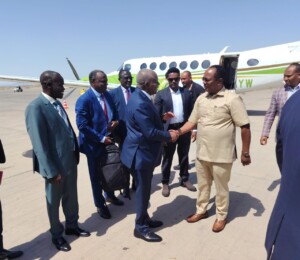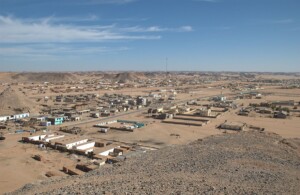El Sadig El Mahdi: ‘Sudan regime like Anglo-Egyptian colonialists’
El Sadig El Mahdi, Head of the National Umma Party and chairman of the Sudan Call coalition, has strongly condemned the killing of demonstrators and the excessive violence against them during the past month. He likened the current regime in Khartoum to the days of the Anglo-Egyptian colonisation.
 Imam El Sadig El Mahdi, Head of the National Umma Party and chairman of the Sudan Call coalition (File photo)
Imam El Sadig El Mahdi, Head of the National Umma Party and chairman of the Sudan Call coalition (File photo)
El Sadig El Mahdi, Head of the National Umma Party and chairman of the Sudan Call coalition, has strongly condemned the killing of demonstrators and the excessive violence against them during the past month. He likened the current regime in Khartoum to the days of the Anglo-Egyptian colonisation.
During his Friday sermon at El Ansar mosque Wad Nubawi on Friday, El Mahdi, Imam of the El Ansar [followers of his ancestor Mohamed Ahmed El Mahdi who, in 1881, stood up against Anglo-Egyptian rule in Sudan], called on the military and regular forces to refrain from shedding blood of the innocent, pointing out that professional honour and citizenship rights prevent this.
He said he had addressed members of the UN Human Rights Council to investigate the crimes against protesters.
He explained his signing on the Declaration of Freedom and Change, his support for the popular movement calling for the overthrow and demanding the departure of the regime, the dissolution of the government and the formation of a national transitional government, whose duty is to achieve a just peace, guarantee human rights and freedoms, and hold a national constitutional conference to write the country's constitution.
El Mahdi said that after extensive consultations, the allied opposition groups agreed on the text of a new memorandum, the Salvation Charter. About 100 people representing the various components of Sudanese society, will hand the memo to the Sudanese Parliament.
He added that new mass demonstrations and silent protests are planned, with the participation of the protesting youths, “who have become the symbols of society” and political and civil society leaders in the capital and the states. He explained that the silent marches will be followed by mass sit-ins in 100 locations inside and outside Sudan calling for the implementation of the Freedom and Change Declaration.











 and then
and then